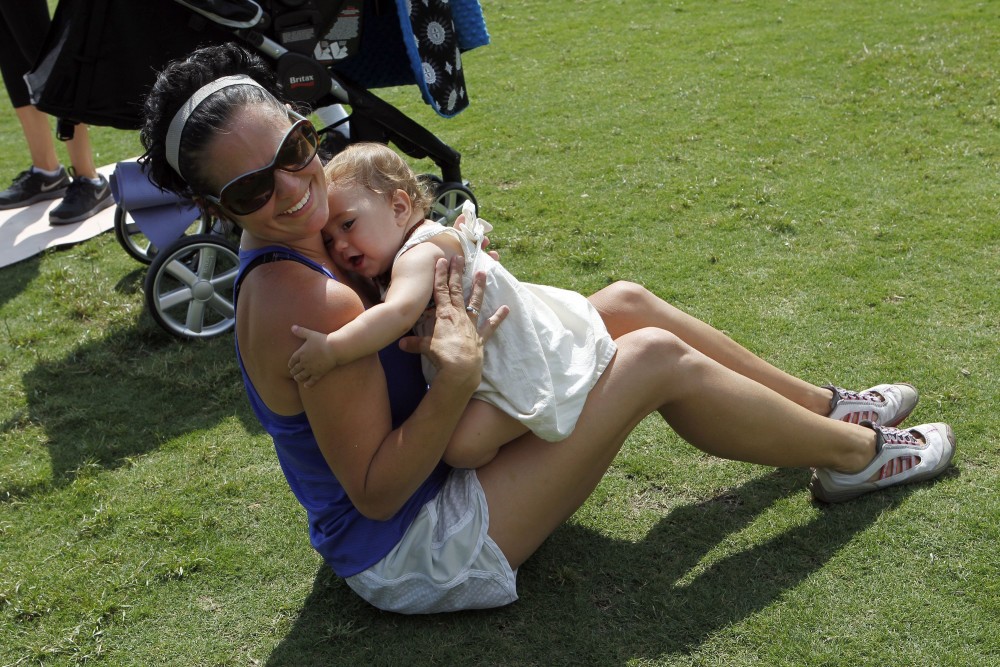The Dallas Morning News.
Photo by Lara Solt/Staff Photographer
DALLAS
Before they start lunging and squatting and crunching, the 19 women tend to their babies. They hand them plastic cups filled with Cheerios and fruit. They adjust the sun visors on their identical black strollers and rock hesitant infants back and forth.
Then, they run.
“Let’s get warmed up with a nice long trot,” personal trainer and wellness coach Zac Mudd shouts across the lawn.
Stroller wheels squeak as the line of moms and babies zip across the grass and onto the pavement, a blur of neon-colored Spandex, strollers and faint baby gurgles. The women make a lap of Klyde Warren Park and come huffing back to the starting point, immediately launching into a set of burpees.
“These ladies are a lot tougher than they let on,” Mudd says, glancing down at his stopwatch. “Most of them have some kind of exercise experience. They’ll come in CrossFit and 5K T-shirts. But it’s easy to fall into a slump, to get out of the rhythm of being healthy. Their schedule has been dedicated to taking care of a baby.”
The Stroller Boot Camp, sponsored by the YMCA, is a place where babies are welcome and strollers are used as a piece of exercise equipment, just like yoga mats and resistance bands.
During a phase of a new mom’s life when everything is alien and different, her schedule, body and social groups, the weekly Tuesday morning class is a safe place. Moms can focus on active recovery and connect with women going through similar life milestones.
“Everyone is looking for the same goal, looking to get their abs back and get in shape,” YMCA wellness coordinator Shelli Cheyney says. “Some of the moms are a little bit depressed because they want to get back to the way they were before the baby. They can find someone who is going through the same thing that they are.”
When Lara Neri, 40, came to Stroller Boot Camp for the first time six months ago, she was the only mom in attendance.
Neri continued to make the trip every Tuesday with her dog and her four little ones, ranging in age from 6 months to 8 years.
As summer neared, attendance at the camp doubled, then quadrupled.
buy penegra generic buy penegra online no prescription
Now, about 20 moms attend class every week.
“It’s definitely growing,” Neri says. “It’s great because you can find something to do with your kids while you exercise. I’ve tried workout videos, and they never work. The baby won’t allow it. The second you get it started, they want to be picked up.
Traditional gym environments can also be tough. The second your baby starts crying, you get pulled out of class.”
Laura Lott, 28, a first-time mom of 2-year-old Laney, attended the boot camp for the first time on a breezy Tuesday.
In the middle of a vigorous leg-lift set, Lott leans over to hand an apple to Laney, docilely watching from her stroller. Another mom wheels her baby off to the sidewalk, pulling out an Elmo diaper and changing him on the grass.
“I mean, look around,” Lott says. “We have a community of moms going through a similar leg of life. It’s great to be here because of the adult interaction. It helps us find resources and tools, and it’s nice to chat with each other.”
The weekly boot camp helps women find structure and create a schedule, to find out they aren’t alone, Neri says.
“It helps combat that feeling you get where you are alone on an island watching the rest of the world move by,” she says. “It’s important for emotional and mental health. The endorphins help me cope. Postpartum depression and anxiety can hit you hard. It is so important for moms to exercise, and not just for physical health.”
A cocktail of postpartum hormones and sleep deprivation can leave a mom feeling listless, isolated and zombielike.
Up to 70 percent of women experience baby blues in the weeks and months after giving birth, according to medical experts. Women are also likely to develop negative feelings about their post-baby body.
“It’s all about becoming more confident, getting on a schedule and getting support,” said Dr. Sheila Chhutani, an OB/GYN at Texas Presbyterian Hospital Dallas. “It is very important for them to connect with other women. I have had a couple of moms who had no support systems and experienced more signs of depression.”














































































































































































































































































































































































